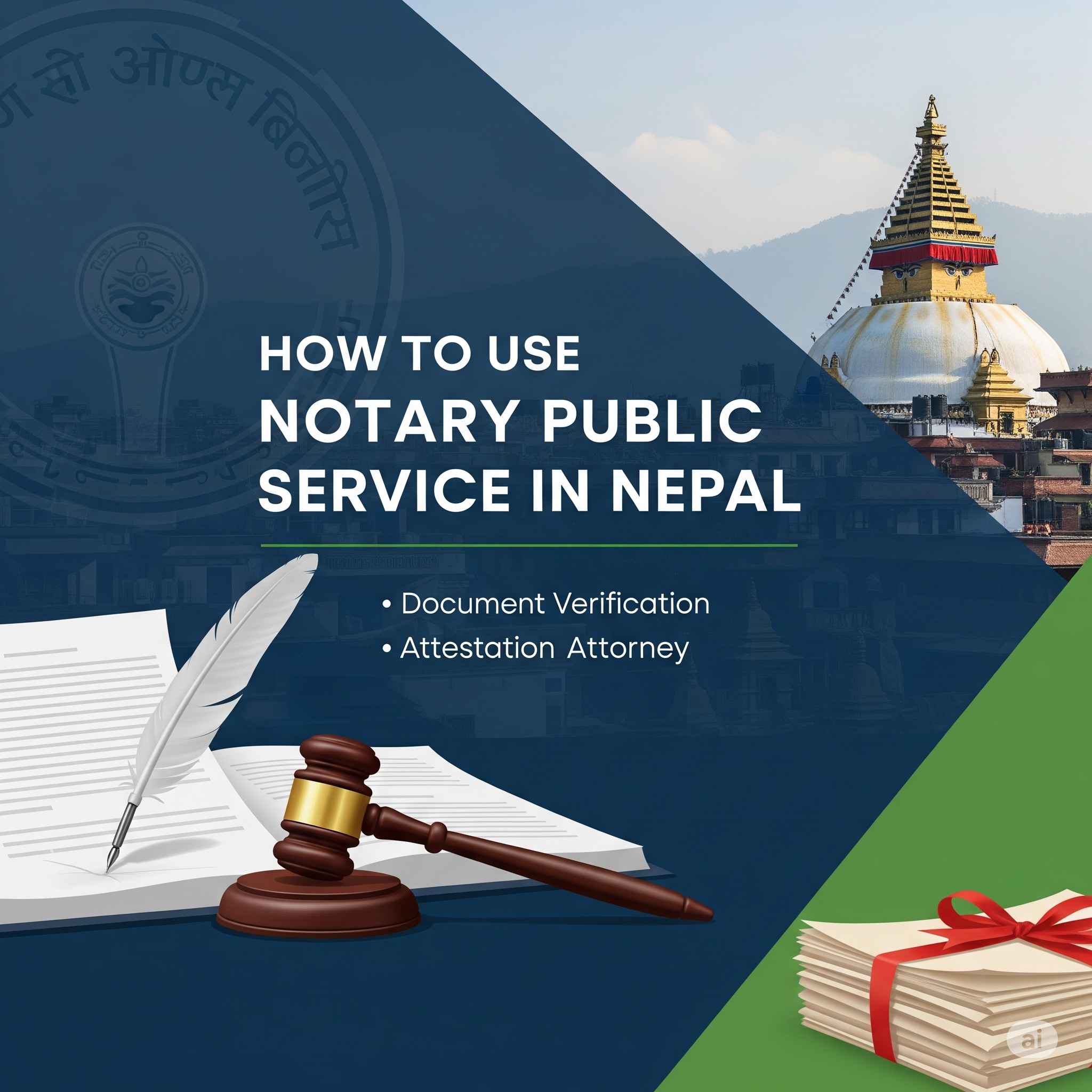Table of Contents
Understanding Notary Public Service in Nepal
Notary public service in Nepal is a crucial legal process that authenticates and certifies documents, ensuring their validity and credibility in various legal and official contexts. The notary public system in Nepal is governed by the Notary Public Act, 2063 (2007) and Notary Public Rules, 2064 (2008), which establish the legal framework for document authentication and certification.
In Nepal, notary services are essential for both personal and business transactions, providing legal authentication that documents are genuine and properly executed. Whether you’re a general citizen needing personal document notarization or a business owner requiring commercial document certification, understanding the notary public process is vital for legal compliance.
Education Consultancy Registration in Nepal |FDI In Nepal 2025
What is a Notary Public in Nepal?
A notary public in Nepal is defined under Section 2(a) of the Notary Public Act, 2063 as “a person appointed or recognized as a Notary Public pursuant to this Act.” Notary publics are government-authorized legal officers responsible for certifying, verifying, and authenticating documents for official use.
The primary functions of notary services in Nepal include:
- Witnessing the signing of documents
- Administering oaths and affirmations
- Certifying copies of original documents
- Authenticating the execution of various legal instruments
- Providing translation and certification services for official use
Legal Framework Governing Notary Services in Nepal
The notary public system in Nepal operates under a comprehensive legal framework that ensures standardization and legal compliance:
Primary Legislation
- Notary Public Act, 2063 (2007) – Establishes the legal foundation for notary services
- Notary Public Rules, 2064 (2008) – Provides detailed procedures and fee structures
- Evidence Act, 2031 (1974) – Governs admissibility of notarized documents
- Civil Code, 2074 (2017) – Provides broader legal context for document authentication
Key Provisions
- Section 9: Outlines duties and powers of notary publics
- Section 10: Specifies documents that can be notarized
- Section 11: Describes the notarization process
- Section 12: Mandates maintenance of notary records
- Section 13: Establishes fees for notarial services
Who Can Become a Notary Public in Nepal?
The Nepal Notary Public Council sets strict requirements for individuals seeking to become notary publics. According to Section 3 of the Notary Public Act, 2063, the following qualifications are required:
Essential Requirements
- Nepalese citizenship
- Bachelor’s degree in law from a recognized university
- At least seven years of experience as a law practitioner
- Good moral character and no criminal record
- Successful completion of the notary public examination conducted by the Nepal Bar Council
Disqualifications
Individuals are disqualified from becoming notary publics if they:
- Have not passed the required examination
- Lack the necessary qualifications
- Have been punished for serious criminal offenses
- Are not of good character
- Are non-Nepali citizens
- Have been declared insolvent
- Do not have normal mental condition
Types of Notary Services Available in Nepal
Notary services in Nepal are available through different channels, each serving specific needs and requirements:
1. District Court Notaries
- Located in district courts throughout Nepal
- Typically government-employed legal officers
- Often provide standard notarization services
- Generally follow fixed fee structures set by government regulations
- May have limited operating hours aligned with court schedules
2. Private Notary Service Providers
- Independent notary publics operating through law firms
- Offer flexible service hours including weekends
- Provide specialized notarization services
- May charge premium fees for convenience and additional services
- Often offer mobile notary services and online consultations
3. Law Firm Notaries
- Licensed attorneys with notary public certification
- Provide comprehensive legal services alongside notarization
- Offer expert guidance on complex document requirements
- Typically charge higher fees but provide added legal expertise
Current Notary Fee Structure in Nepal
The notary fee structure in Nepal is regulated by the Notary Public Rules, 2064 and varies based on document type and complexity. Below is the current fee structure:
Notary Service Fees in Nepal
| Service Type | Fee Range (NPR) | Description |
|---|---|---|
| Basic Notarization | 500 – 1,000 | Standard document certification |
| Complex Documents | 1,000 – 3,000 | Business contracts, property deeds |
| Notarization with Apostille | Additional 1,000 – 2,000 | For international document use |
| Translation Services | 300 – 800 per page | Document translation with certification |
| Urgent Services | 50% – 100% additional | Same-day or expedited processing |
Factors Influencing Notary Fees
- Document complexity and length
- Number of signatures requiring verification
- Translation requirements (Nepali to English or vice versa)
- Urgency of service required
- Location and accessibility of notary service
- Additional authentication requirements
Step-by-Step Process for Getting Documents Notarized in Kathmandu
The notarization process in Nepal follows a standardized 7-step procedure that ensures legal compliance and document authenticity:
Step 1: Document Preparation
Before seeking notary services, ensure that:
- All documents are complete and accurate
- Blank spaces are filled or crossed out
- Required information is properly included
- Supporting documents are gathered and organized
Step 2: Finding a Qualified Notary Public
Locate a licensed notary public through:
- District courts in Kathmandu Valley
- Reputable law firms with notary services
- Private notary service providers
- Nepal Notary Public Council website for verified practitioners
Step 3: Application Submission
Submit an application to the notary public along with:
- Completed application form
- Original documents requiring notarization
- Copies of supporting documents
- Valid identification (citizenship certificate or passport)
Step 4: Identity Verification
The notary public will:
- Verify your identity using government-issued ID
- Confirm document completeness
- Ensure legal capacity to sign documents
- Check for proper authorization (if acting as agent)
Step 5: Document Review and Explanation
The notary public will:
- Read the document content to you
- Ensure understanding of document contents
- Explain legal implications of signing
- Answer any questions about the document
Step 6: Witness Verification and Oath Administration
For notarization completion:
- Two witnesses must verify the document
- Witnesses sign the document or separate memo
- Oath or affirmation is administered (for affidavits)
- Voluntary consent is confirmed and documented
Step 7: Certification and Sealing
Final notarization steps include:
- Official signature by the notary public
- Application of notary seal or stamp
- Recording certification number from register
- Preparation of multiple copies if required
- Maintenance of notary records as mandated by law
Documents Commonly Requiring Notarization in Nepal
Various types of documents require notary public certification in Nepal for legal validity:
Personal Documents
- Affidavits and sworn statements
- Power of Attorney documents
- Birth and death certificates (for international use)
- Marriage certificates for overseas purposes
- Academic certificates and transcripts
- Identity document copies for official use
Business and Commercial Documents
- Business contracts and agreements
- Memorandum of Understanding (MoU)
- Company registration documents
- Commercial invoices and bills of lading
- Board resolutions and corporate minutes
- Partnership agreements
Property and Real Estate Documents
- Property deeds and transfer documents
- Land ownership certificates
- Real estate purchase agreements
- Mortgage documents and loan agreements
- Property valuation reports
- Lease agreements
Where to Find Reliable Notary Services in Nepal
Finding trusted notary services is essential for ensuring document authenticity and legal compliance:
Kathmandu Valley Notary Services
- District Court Notaries: Available at Kathmandu, Lalitpur, and Bhaktapur district courts
- Private Notary Firms: Located in major commercial areas like New Road, Durbar Marg, and Putalisadak
- Law Firm Notaries: Offered by established legal practices in Kamaladi, Thamel, and Baneshwor
Major Cities Outside Kathmandu
- Pokhara: District court and private notary services available
- Biratnagar: Notary services at district court and law firms
- Birgunj: Court notaries and private practitioners available
- Nepalgunj: District court notary services with private alternatives
Online Notary Services
While fully digital notarization is not yet available in Nepal, some providers offer:
- Remote document submission via email
- Online consultation for document preparation
- Digital copy delivery after notarization
- Courier services for document pickup and delivery
What Documents Are Required for Notarization?
To obtain notary public services in Nepal, you must provide specific documentation:
Essential Identification Documents
- Citizenship certificate (original and copy)
- Passport (for foreigners or dual citizens)
- National ID card with photograph and signature
- Driving license (acceptable secondary ID)
Supporting Documents
- Relationship verification papers (if applicable)
- Power of Attorney or letter of authority (if acting as agent)
- Original documents requiring notarization
- Two copies of each document for certification
Special Requirements
- Foreigners: Certified identity documents from concerned embassy
- Business representatives: Company registration documents
- Property transactions: Land ownership certificates and recent tax receipts
How Long Does Notarization Take in Nepal?
The notarization timeline in Nepal varies based on several factors:
Standard Processing Times
- Simple document notarization: 1-2 hours
- Complex documents: 1-2 business days
- Documents requiring additional verification: 3-5 business days
- Translation and notarization: 2-3 business days
Factors Affecting Processing Time
- Document complexity and length
- Number of signatures requiring verification
- Availability of witnesses
- Notary public workload
- Additional verification requirements
- Translation needs (if applicable)
Expedited Services
Many notary service providers offer urgent processing:
- Same-day service: Available at premium rates
- Express service: Within 24 hours
- Priority processing: For business and time-sensitive documents
Legal Validity and Recognition of Notarized Documents
Notarized documents in Nepal carry significant legal weight and are widely recognized:
Domestic Recognition
- Courts and tribunals accept notarized documents as evidence
- Government agencies require notarization for official submissions
- Banks and financial institutions demand notarized documents
- Educational institutions require notarized academic records
International Recognition
- Apostille certification available for Hague Convention countries
- Embassy attestation required for non-Hague countries
- Consular legalization for specific international purposes
- Translation and notarization for multilingual documents
Legal Presumptions
Under Nepalese law, notarized documents enjoy certain legal presumptions:
- Authenticity of signatures is presumed
- Voluntary execution is assumed
- Document integrity is maintained
- Legal capacity of signatories is established
Common Questions About Notary Services in Nepal
What is the difference between notarization and certification?
Notarization involves a notary public legally verifying your document and identity, while certification typically refers to attesting that a copy is true to the original. Notarization provides stronger legal authentication.
Where is the Nepal Notary Public Council located?
The Nepal Notary Public Council main office is located in Kathmandu with contact information:
- Phone: 01-5452357
- Mobile: 9748277003
- Email: nepalnotary@gmail.com
What are the penalties for notary misconduct in Nepal?
Notary publics found guilty of misconduct may face:
- Up to 4 years imprisonment
- Fines up to NPR 2,00,000
- Revocation of notary license
- Professional disqualification
Can foreigners get documents notarized in Nepal?
Yes, foreigners can obtain notary services in Nepal by providing:
- Valid passport and visa
- Certified identity documents from their embassy
- Additional documentation as required by the notary public
Best Practices for Using Notary Services in Nepal
To ensure smooth notarization process, follow these expert recommendations:
Preparation Tips
- Prepare documents in advance with all required information
- Bring original identification and supporting documents
- Arrange witnesses beforehand if required
- Understand document contents before signing
- Verify notary credentials through the Nepal Notary Public Council
During Notarization
- Sign documents only in the notary’s presence
- Answer questions truthfully during oath administration
- Review notarized documents carefully before leaving
- Obtain receipts for all payments made
- Request multiple copies if needed for future use
After Notarization
- Store notarized documents securely
- Keep contact information of the notary public
- Maintain records of all notarization transactions
- Verify acceptance of notarized documents by intended recipients
- Seek legal advice for complex document requirements
Conclusion: Ensuring Legal Compliance Through Professional Notary Services
Notary public service in Nepal plays a vital role in maintaining the integrity and authenticity of legal documents. Whether you’re an individual citizen needing personal document certification or a business owner requiring commercial document authentication, understanding the notarization process is essential for legal compliance.
The Nepal notary system, governed by the Notary Public Act, 2063 and related regulations, provides a robust framework for document authentication that is recognized both domestically and internationally. By following the proper procedures and working with qualified notary publics, you can ensure that your documents meet all legal requirements and are accepted by courts, government agencies, and international institutions.
For the best results, always choose licensed notary service providers who maintain proper credentials, follow established procedures, and provide comprehensive documentation of their services. Remember that proper notarization is not just a formality—it’s a crucial step in protecting your legal rights and ensuring the validity of your important documents.
Disclaimer: This article provides general information about notary public services in Nepal and does not constitute legal advice. For specific legal concerns or document requirements, consult with a qualified legal professional or contact the Nepal Notary Public Council directly.
Corporate Biz Legal & Company Darta Nepal is a trusted law firm in Nepal, providing expert company registration services in Nepal with full legal compliance and professional support.




